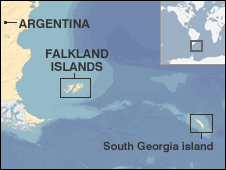The Mysterious Case of the Falkland Toothpaste Tube April 15, 2018
Author: Beach Combing | in : Contemporary , trackbackIntroduction
The spring of 1982 was a time of some tension in the South Atlantic and would climax with Argentine troops landing on Falklands, and the subsequent battles between the British taskforce and the Argentinean army and navy. However, as so often when the gods in Olympus are still deciding which side to back, farce reared its pretty blond head. I introduce you to the mysterious case of the tube of toothpaste and the English-Spanish dictionary.
Enter the Scrap Merchants
The first hostile act in the South Atlantic took place 19 March, when an Argentinean scrap merchant raised the Argentine flag on South Georgia, an uninhabited archipelago some eight hundred miles from the Falklands, effectively taking possession of the islands: though a long way away, South Georgia was governed out of Port Stanley, the capital of Falklands. This government sponsored ‘invasion’ led to strong words from the British: and effectively brought forward a planned attack on the Falklands. There were reasonable Argentine fears that the British would reinforce the archipelago making an invasion costly or impossible. The Argentine landing would take place 2 April.
Toothpaste Wars
In this febrile atmosphere, a group at Port Stanley on Falkland decided to take matters into their own hands. A day after the flag had been raised on South Georgia, on the night of the 20/21 March, a party entered what was effectively the Argentinean base on Falklands, the LADE offices at Stanley airport (Líneas Aéreas del Estado). They went into an office there and put the Union Jack over the Argentine triband. They took all the files from the office table, stacking them neatly in the corner. Then, with a tube of toothpaste, they wrote: ‘tit for tat, you buggers’. In the interests of science this blogger has tried to write his name in toothpaste and it is surprisingly hard. Two nights later, someone sprayed the words ‘UK OK’ on the LADE windows.
Lost in Translation?
The Argentine response took some time because the phrase proved obscure and it was not initially clear what the vandals had meant to convey. The head Argentines on the island, including Captain Adolfo A. Gaffoglio, had allegedly to resort to an English-Spanish dictionary to understand these strange words. One Spanish translation from the period gives the English phrase as ‘diente por diente, canallas’, which Beach would translate back as ‘tooth for a tooth, you bastards’. But this doesn’t quite do the English justice. ‘Tit for tat’ is not really Old Testament, more gentile irritation, and ‘buggers’, though unquestionably offensive, is often used playfully among friends. The UK naturally downplayed the incident. But the British ambassador in Argentina was given a dressing down and the press in Buenos Aires talked of an outrage to national honour. The junta was keen to justify the invasion and these kind of incidents were just what they were looking for.
Who Did It?
‘Tit for tat’ suggested that the toothpaste incident was revenge for something the Argentineans had done: presumably raising the flag on distant South Georgia; remember that the Union Jack had been introduced into the offices. Yet the problem with this is that the islanders did not know about the South Georgia incident on the night of 20/21 March. Another consideration is that whoever carried out this – might we call it in horrible modern academic parlance ‘micro aggression’? – had keys for the offices. On the basis of this information it has been suggested that either British marines based at Stanley were behind the toothpaste raid: marines had been secretly guarding the airport over growing fears of an Argentine attack on Stanley. Alternatively, some Falklanders had heard through the office of Governor Rex Hunt that the Argentines had been up to no good on South Georgia. Beach would go for the outraged but well connected islanders as he suspects that, drunk or sobre, the Marines would have used something stronger than toothpaste… Somewhere someone will have suggested that this was a false flag operation!
Other insights into the toothpaste incident: drbeachcombing AT gmail DOT com The guilty parties are presumably still out there. We’d love to hear from you!





